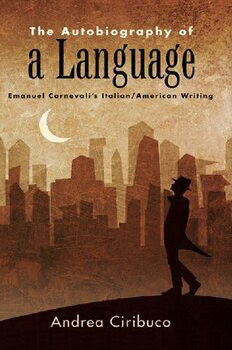
The Autobiography of a Language: Emanuel Carnevali's Italian/American Writing PDF
Preview The Autobiography of a Language: Emanuel Carnevali's Italian/American Writing
The Autobiography of a Language SUNY series in Italian/American Culture ————— Fred L. Gardaphe, editor The Autobiography of a Language Emanuel Carnevali’s Italian/American Writing Andrea Ciribuco Cover image: Arianna Pagliara, Landscape with Man and Suitcase. Reprinted by permission of the artist. Published by State University of New York Press, Albany © 2019 State University of New York All rights reserved Printed in the United States of America No part of this book may be used or reproduced in any manner whatsoever without written permission. No part of this book may be stored in a retrieval system or transmitted in any form or by any means including electronic, electrostatic, magnetic tape, mechanical, photocopying, recording, or otherwise without the prior permission in writing of the publisher. For information, contact State University of New York Press, Albany, NY www.sunypress.edu Library of Congress Cataloging-in-Publication Data Names: Ciribuco, Andrea, 1986– author. Title: The autobiography of a language : Emanuel Carnevali’s Italian/American writing / Andrea Ciribuco. Other titles: Emanuel Carnevali’s cultural translation Description: Albany : State University of New York, [2019] | Series: SUNY series in Italian/American culture | Revision of author’s thesis (doctoral)—National University of Ireland, Galway, 2016, titled Emanuel Carnevali’s cultural translation : an Italian in Modernist America. | Includes bibliographical references and index. Identifiers: LCCN 2018040417 | ISBN 9781438475257 (hardcover : alk. paper) | ISBN 9781438475264 (ebook) Subjects: LCSH: Carnevali, Emanuel—Criticism and interpretation. | Italian American authors—20th century. | American literature—Italian influences. Classification: LCC PS3505.A72752 Z56 2019 | DDC 818/.5203—dc23 LC record available at https://lccn.loc.gov/2018040417 10 9 8 7 6 5 4 3 2 1 Contents Acknowledgments vii Introduction 1 1. Translating Childhood, Decoding America 21 2. The Newcomer and the Splendid Commonplace: Using English as a Second Language 45 3. Representing Italy in America 89 4. A Language for Bazzano: An Italian American Returns Home 133 5. Between the Atlantic and Oblivion: Carnevali in the 1930s 165 Conclusion: Emanuel Carnevali in the 21st Century 197 Notes 203 Bibliography 215 Index 225 Acknowledgments This book would not exist without the support of the people and insti- tutions who accompanied me in the journey through Carnevali’s works, which started as part of my PhD research. I would like to thank the National University of Ireland in Galway, which believed in me enough to grant me the Hardiman scholarship in 2011; and all the friends and colleagues who made it feel like home. In particular, Anne O’Connor and Adrian Paterson proved to be the best thesis supervisors I could desire, providing endless support and useful advice, motivating me constantly to pursue my research goals and improve the quality of my work. Their support and friendship, during and after the PhD, is invaluable. Special thanks go to all the scholars who offered advice and guid- ance during the path that led to this book—especially Paolo Bartoloni, Beryl Schlossman, Loredana Polezzi, and John Paul Russo. I would like to thank the staff of the archives who, in America and Italy, have facilitated the search of material on Carnevali. In par- ticular, I would like to acknowledge the great and continuous help I received from Aurelia Casagrande of the Archivio Comunale di Bazzano in Valsamoggia (BO), Italy—who did all she could to make my search of archival material easier. I am deeply grateful to the estates of Emanuel Carnevali, Ezra Pound, and Kay Boyle for allowing me to quote and discuss material present in the archives. Vorrei ringraziare la mia famiglia per avermi insegnato il valore dello studio e del lavoro; per avermi incoraggiato e aiutato negli studi, anche da lontano dopo che avevo lasciato l’Italia. Then there is Anna, whom I will never be able to thank enough. Our marriage is, without any doubt, the greatest thing that came out of all this. vii viii Acknowledgments This book is dedicated to all those people who, in 2019 as it was in 1914, choose to leave their homes and embark on a journey in search of a better life. Introduction Emanuel Carnevali, in Search of a Language Emanuel Carnevali was an Italian intellectual in America, and an Ameri- can writer born in Italy. Neither definition describes him completely, and his career is the story of a long, troubled passage across linguistic and national borders. This troubled passage, on the other hand, was strikingly fertile: it gave us one of the first Italian-American bodies of work to be recognized in American literary circles, as well as a crucial document of the many possibilities and challenges that come with choosing one language over another. Carnevali was born in Florence in 1897, his childhood a prelude to emigration: raised by his mother, Matilde Piano (who was separated from his father, Tullio), Carnevali lived in Pistoia and then in the Pied- mont towns of Biella and Cossato. After his mother’s premature death in 1908, Carnevali was left in the care of his aunt Melania, and then of his father. He was sent to a boarding school in Venice in 1911 and then attended school in Bologna. Because of a conflictual relationship with his father, Emanuel decided to emigrate. In March 1914, he left for New York with his brother Augusto. Carnevali lived in poverty in New York, doing menial jobs such as waiter and dishwasher. In 1917, he married another Italian immigrant, Emilia Valenza. He started writing poetry in English, and his first poems were published in 1918; soon he was publishing poetry, short fiction (most notably the series “Tales of a Hurried Man”) and criticism in liter- ary reviews. His work appeared in many of the most important literary reviews in the modernist circles of New York and Chicago, including Poetry, a Magazine of Verse, The Little Review and Others. After moving 1
